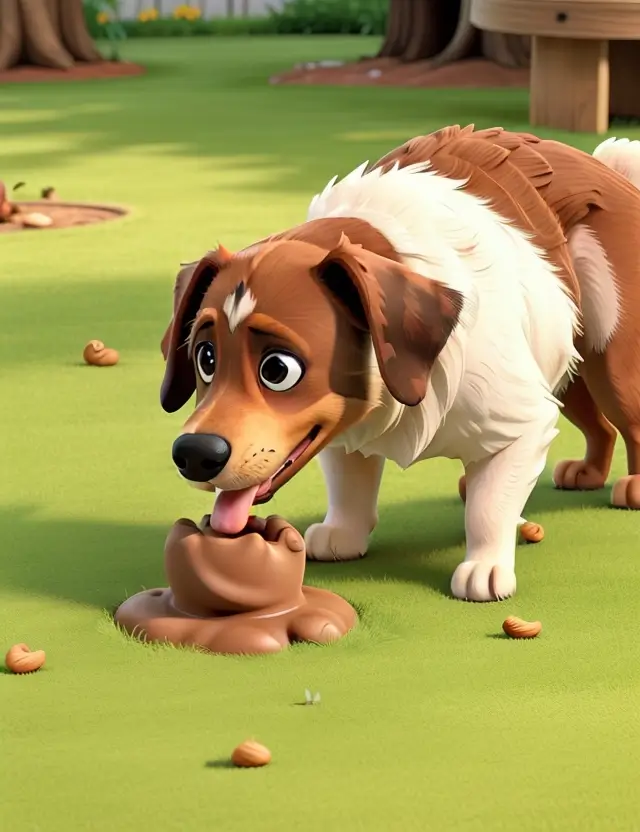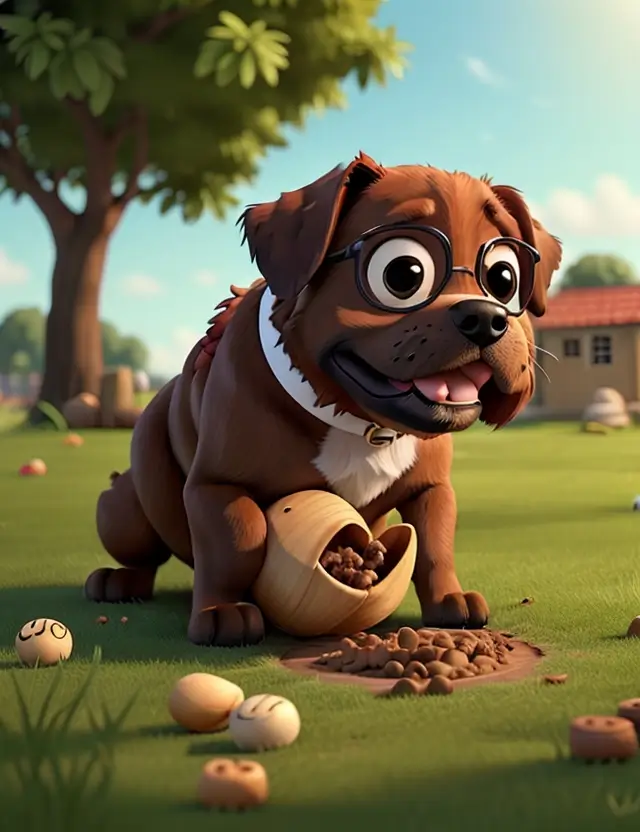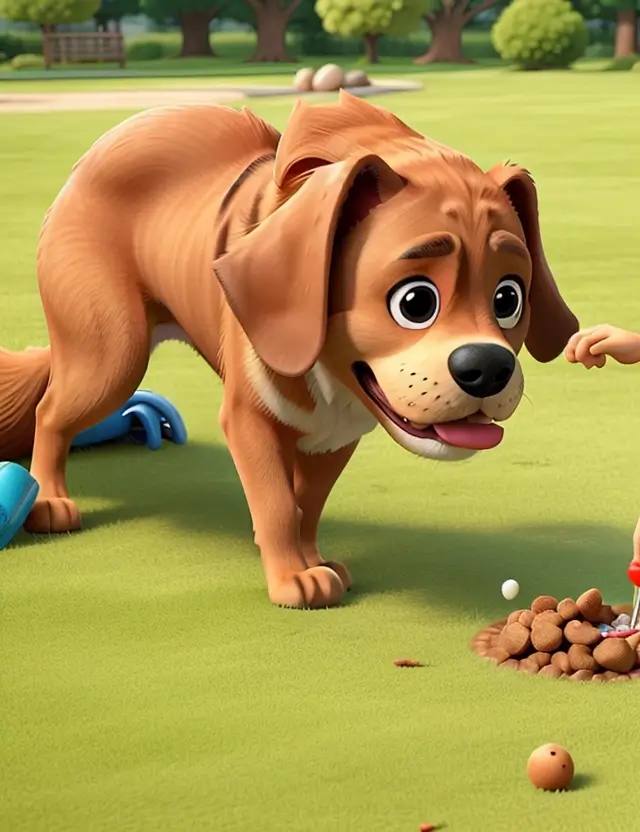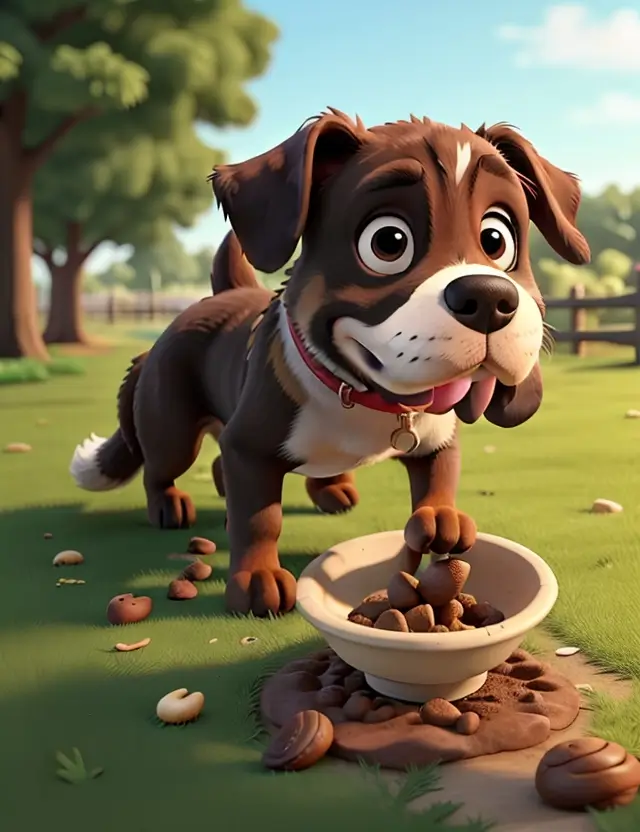You’re absolutely not alone. A myriad of dog owners scratch their heads over this quirky, yet somewhat unsettling canine habit. The goal of this write-up? To demystify the reasons behind this behavior and offer actionable solutions.
The Science Behind the Behavior
Dive into the arcane term, coprophagia, and you’ll find it’s not exclusive to our four-legged friends. Yet, in the canine world, it’s a particularly striking behavior that perplexes humans. Understanding coprophagia isn’t merely academic; it can help you deal with it more effectively.
Table 1: Types of Coprophagia in Dogs
| Type | Description | Frequency |
|---|---|---|
| Autocoprophagy | Dog eats its own feces | Uncommon |
| Intraspecific | Dog eats poop from other dogs | More common |
| Interspecific | Dog eats poop from different species (e.g., cats) | Less common |
Why are dogs so keen on this? For some, it’s a matter of nutrition. Scarcity of essential nutrients may compel a dog to seek alternative sources, even if it means eating their own feces.
Could it be a health concern? Sure, but let’s not jump the gun. It could just as easily be a behavioral issue. A dog, left to its own devices or neglected, may find its own ways of entertaining itself, and yes, eating poop could be part of the repertoire.

Complex, ain’t it? Hence, understanding this behavior ain’t about isolating a single reason. Dogs are nuanced creatures, and this idiosyncrasy calls for a holistic approach.
Common Reasons: Diet
A dog munching on poop could be a symptom of poor diet. If you’re scratching your head wondering why your pooch engages in such peculiar munchies, then understanding the role of diet becomes imperative.
Poor Diet as a Culprit
You see, a low-quality diet lacking in essential nutrients may prompt Fido to explore, let’s say, unconventional food sources. Ever find yourself craving something, but you can’t quite put your finger on it? That might be what’s happening to your dog, except they’re settling on feces to meet nutritional deficiencies. Yeesh.
Table: Common Nutrients Lacking in Poor Dog Diets
| Nutrient | Role in Dog’s Body | Potential Consequences if Lacking |
|---|---|---|
| Protein | Muscle development | Weakness, fatigue |
| Fatty Acids | Skin and coat health | Dry skin, dull coat |
| Fiber | Digestive regularity | Constipation, diarrhea |
| Minerals | Various bodily functions | Various health issues |
It’s not merely about the kibble; it’s about what’s in it or what’s not. Consider a dog that’s always been fed a low-quality diet. Wouldn’t you, if you were in their shoes, search for some missing zest?
Nutrition: The Silver Bullet?
Ah, the silver lining! Switching to a balanced, nutrient-rich diet might be your ace in the hole. Proper nutrition can provide the nutrients and the umami that could make those dung delicacies less attractive.

- High-Quality Dog Food: The label matters, folks. Look for AAFCO (American Association of Feed Control Officials) approved food. It should contain the vital nutrients your pup requires.
- Fresh Fruits and Veggies: A little bit of fresh produce won’t harm. Some safe options include carrots, apples, and cucumbers. Just skip the onions and grapes, okay?
- Consult Your Vet: No one knows your dog better than the vet, except maybe you. They can offer personalized diet plans, so the feces buffet can finally close shop.
A better diet won’t just make your dog turn their nose up at poop, but it’ll also improve their overall well-being. Win-win, eh?
So the next time you catch your dog red-pawed, think before you scold. Maybe, just maybe, improving their diet could close this unpleasant chapter once and for all.
Medical Conditions
Sometimes it’s not just a taste for the outré or a dietary lapse that prompts your dog to engage in fecal feasting. Medical conditions can also lead your pet down this rather distasteful path. Let’s lift the veil on some of those hidden culprits, shall we?

Underlying Ailments You Should Know
If your dog’s appetite for poop seems to escalate, suspect that something deeper could be amiss. Illnesses may rear their ugly heads in weird ways, and poop-eating is no exception.
Digestive Disorders
Ever felt your tummy actin’ all funky? Digestive issues could provoke a similar curiosity in your dog. Conditions like malabsorption or pancreatitis can make nutrients pass right through, hence prompting the dog to re-ingest their waste.
Parasites
It’s grim but true. Worms and other parasites could leech essential nutrients, making your dog consider alternative, um, menus.
Diabetes and Thyroid Issues
Endocrine problems, including diabetes and thyroid issues, may result in heightened appetite, even for poop.
Table: Signs It’s Time to Consult a Vet
| Sign | What it Could Mean | Additional Symptoms |
|---|---|---|
| Weight Loss | Malabsorption, Parasites | Reduced energy |
| Increased Appetite | Diabetes, Thyroid Issues | Excessive thirst |
| Digestive Upset | Digestive Disorders | Vomiting, diarrhea |

When to Make That Vet Appointment
If Fido’s interest in feces coincides with any of the above symptoms, skedaddle to the vet posthaste. It’s not just about nixing an unpleasant habit but potentially catching a severe condition before it exacerbates.
- Multiple Symptoms: One sign could be a fluke. Two or more? Raise your concerns.
- Change in Behavior: Besides their new culinary interests, other behavioral changes could be a red flag.
- Poop-Eating Persists: If dietary changes and home remedies aren’t making a dent, it’s vet time.
So yeah, that dreaded poop-eating could be a symptom rather than the core issue. A vet’s perspective can provide the real deets, guiding you on how to restore your dog’s health and dignity. Keep those peepers peeled for signs, and don’t hesitate to seek professional help.
Puppies and Poop-Eating
Ah, puppies. Those adorable furballs with paws too big for their bodies and a penchant for the inexplicable. Yep, we’re discussing why puppies more than adult dogs find poop irresistible. Let’s delve into this, shall we?
The Curiosity Factor
First off, let’s chalk some of it up to curiosity. Puppies are like little sponges, eager to absorb the world around them. Everything’s new, everything’s a game, and unfortunately, that sometimes includes poop.
Learning from Mom
In the early stages of life, momma dog will often clean her puppies, which entails eating their feces to keep the area clean. The wee ones might pick up this behavior, thinking, “If mom can do it, so can I!”
Nutritional Needs
Growing bodies require more nutrients. Missed nutrients sometimes drive puppies to supplement their diet in, well, less conventional ways.
Table: Will Puppies Grow Out of It?
| Age Range | Likelihood of Eating Poop | Grows Out of It? |
|---|---|---|
| 3-6 Months | High | Maybe |
| 6-12 Months | Moderate | Likely |
| 12+ Months | Low | Most Likely |
Will They Outgrow This Behavior?
The million-dollar question! Many puppies tend to leave their poop-eating days behind as they grow older and wiser. Usually, as their digestive systems become more efficient and they adapt to a balanced diet, the urge dwindles.
- Increasing Dietary Efficiency: As puppies age, they generally get better at absorbing nutrients from their food. This decreases the allure of their own waste.
- Maturity: Just like human kiddos, pups grow up and often grow out of bizarre habits. More often than not, this odd culinary choice fades with age.
So, fret not! Your pup’s affinity for poop could very well be a passing phase, a quirk in their youthful exploration of the world. Monitoring their diet and promoting healthy behaviors can often nudge them towards more, let’s say, mainstream dietary choices. Keep your fingers crossed; chances are good your pupper will age out of this icky predilection.
Environmental Factors
Alright, we’ve chatted about medical conditions and why puppies seem especially intrigued by poop. But what about environmental factors? You heard me right. Sometimes, it’s not a dog’s biology that makes ’em do the dirty deed, but rather their surroundings.
Littermate Influence
Firstly, consider their canine siblings. If a dog spots its brother or sister munching on feces, that dog might think, “Hey, that seems like a good idea.” It’s like a weird, unappetizing version of monkey see, monkey do.
Table: Influence Levels by Environment
Environmental Factors Influence Level Littermates High Older Dogs Moderate Human Behavior Low to Moderate
Crowded Spaces
Dogs who live in cramped quarters or with multiple other pets could also develop this habit. High stress levels may compel a dog to do all sorts of odd things, including eating poop. It’s almost like their form of ‘acting out.’
Social Standing
In a multi-dog household, the underdog might eat poop to hide the evidence, so to speak. It’s a way of avoiding punishment for making a mess. Bizarrely, it’s often a form of submission.
Human Impact
Last but not least, your own behavior can play a role. Excessive punishment for house soiling accidents might actually encourage your pet to eat their poop, as a way of eliminating evidence. No joke, it’s like a canine cover-up operation.
Necessities
Now, if you’re noticing this icky habit, perhaps consider the following steps:
- Socialization: Exposure to diverse experiences and environments often results in a well-adjusted pup, less likely to snack on their droppings.
- Supervision: Always keeping an eye on your furry friend, especially during walks or while interacting with other dogs, can offer you the chance to nip this behavior in the bud.
- Cleanliness: Maintain a clean living space. Less available poop equals fewer opportunities for the habit to persist.
In conclusion, don’t overlook your doggo’s surroundings when investigating this rather distasteful habit. If their environment is pushing them to eat poop, changes can be made that might make this behavior vanish like a treat at snack time.
Training to Avoid Poop-Eating
So, you’re over the “ick” factor and wanna find out how to train your pooch not to indulge in poop. Glad you’re here, for this segment delves into practical training tips to tackle this issue.
Commands are Your Friend
First thing’s first. Good ol’ fashioned voice commands, like “leave it,” can be wildly effective. Training your dog to respond to this phrase can not only save your shoes from being chewed but also keep their snout away from feces.
Table: Efficiency of Training Methods
Training Methods Efficiency Rating Voice Commands High Treat Rewards High Diverting Attention Moderate Specialized Products Variable
Yummy Rewards
Whenever your fur baby obeys the “leave it” command, give them a treat that’s more appealing than the fecal matter they were eyeing. Positive reinforcement works wonders. This ain’t rocket science; dogs love treats!
Divert Attention
Catch your dog in the act? Squeak a toy or make an unusual noise. Your aim? Divert their attention. Chances are they’ll bolt toward the sound, forgetting all about the poop they were about to snack on.
Consult the Pros
It’s not cheating to seek help from a dog behaviorist. These experts offer keen insights into why your dog acts the way it does and how you can modify its behavior.
Tip Lists for the Desperate
- Timing: Be vigilant right after meals. That’s when they’re most likely to, um, create the ‘snack’ that tempts them.
- Leash Training: Keep your canine buddy on a short leash during walks to control their sniffing and tasting tendencies.
- Exercise: A tired dog is less inclined to get into mischief, including munching on feces. More play, less poo!
- Specialized Products: There are nifty products designed to make poop taste terrible. Although, it’s a bit confusing how they make something already disgusting taste even worse!
Tech to the Rescue
Consider tech gadgets like ‘doggy cams’ for when you’re not around. You can issue voice commands via the device to deter your pet from undesired activities. Yeah, you’ll be like a spy but for a noble cause.
In summary, banishing this behavior demands vigilance, smart training, and sometimes, professional help. So arm yourself with these tips and set forth. May the feces odds be ever in your favor!
Potential Risks
Curious about the potential risks tied to a dog’s scat munching? Well, it ain’t just gross; it can be downright perilous for both your four-legged friend and, yep, even you.
Canine Health Dangers
Dogs indulging in their own or other animals’ feces could potentially ingest parasites like Giardia, Coccidia, and various types of worms. Trust me, you don’t want these critters hosting a party inside your dog.
Table: Risky Stuff in Poop
Risk Elements Danger Level to Dogs Danger Level to Humans Parasites High Moderate Bacteria High High Undigested Food Low Not Applicable
Human Risks
It doesn’t stop there, mates. Canines that snack on feces could serve as a vehicle for disease transmission to humans. A dog licking its own fur post-scat-snacking could transfer parasites and bacteria to your hands or even face. Yikes!
FAQ Section
Alright, let’s blitz through some questions folks often ponder on this topic.
- Why does my dog eat his own poop?
It could be behavioral, medical, or dietary. Assess for changes in these areas. - Will my dog grow out of eating poop?
Puppies are more prone to this and some do outgrow it. - Are there deterrents to make poop unappealing?
Specialized products can make feces taste even worse to your dog. - Why do dogs eat cat poop?
Cat food contains proteins that may remain in the feces, making it enticing to dogs. - Is eating poop harmful to my dog?
It can be. Parasites and bacteria are the main concerns here. - Why would a dog eat another dog’s poop?
Dogs might find the feces of other dogs appealing due to its scent or residual food particles. - How do I stop my dog from eating poop?
A blend of vigilance, proper diet, and training can work wonders. - Why do dogs eat their own feces but not other types of waste?
Dogs may be attracted to their own scent or the residual scent of the food they’ve eaten. - What to do if my dog ate poop and is now sick?
Vet visit, pronto!
Conclusion
So what’s the verdict? This feces fiesta presents more than just an “eww” factor; there are palpable risks involved. Fortified with these details, your journey toward resolving this issue needn’t be a labyrinthine task. Heed the signs, equip yourself with proper training methods, and you might just conquer this beastly behavior.
Armed with the right knowledge and tools, you’re on your way to eliminating this yucky habit from your dog’s repertoire. Keep the poop in the scoop, not in the snout!
Hi, I’m John and I love dogs. Ever since I was a kid, I always wanted to have a furry friend by my side. I grew up with a golden retriever named Max, who taught me a lot about loyalty, friendship, and fun. He was my best buddy for 12 years, and I miss him every day.